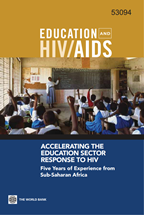 The education sector has been increasingly recognized as playing a key ‘external’ role in prevention and in reducing stigma, and an important ‘internal’ role in providing access to care, treatment and support for teachers and staff, a group that in many countries represents more than 60 per cent of the public sector workforce.
The education sector has been increasingly recognized as playing a key ‘external’ role in prevention and in reducing stigma, and an important ‘internal’ role in providing access to care, treatment and support for teachers and staff, a group that in many countries represents more than 60 per cent of the public sector workforce.
In 2002, the UNAIDS Inter-Agency Task Team on Education (see leaflet) established a working group – known as the ‘Accelerate Initiative Working Group’ – to support countries in sub-Saharan Africa as they ‘accelerate the education sector response to HIV and AIDS’. The philosophy of the Accelerate Initiative is to promote bottom-up planning and activism, informed by regional and national, proven examples of good practice. This is intended to lead to the establishment of programs with strong local ownership, capable of accessing suitable funding and implementation at all levels of the education sector.
Key partners of the Initiative include: governments, United Nations agencies, bilateral partners and civil society, as well as key stakeholders, including people living with HIV and AIDS, teachers’ unions and the media. During the following five years, education sectors of 37 countries, responsible for more than 200 million, or 85.5 per cent of, school-age children and 2.6 million, or 74.3 per cent of, primary and secondary schoolteachers, participated in this demand-led Initiative of sub-regional and national processes, resulting in extensive information sharing and significant achievements.

